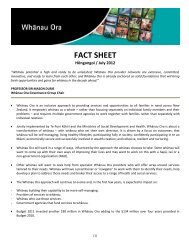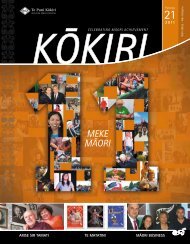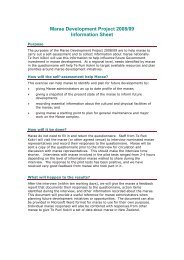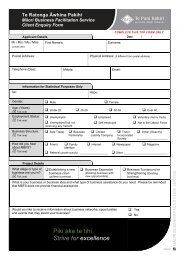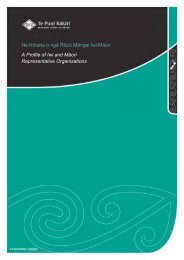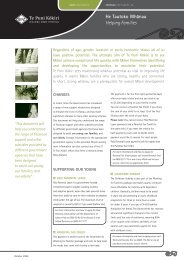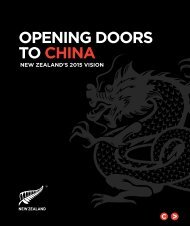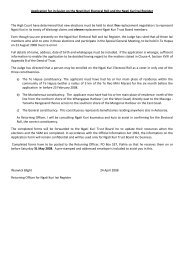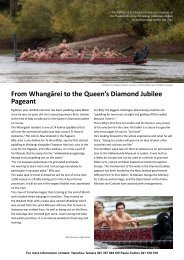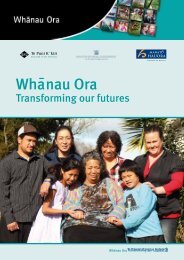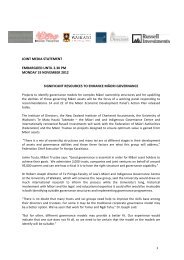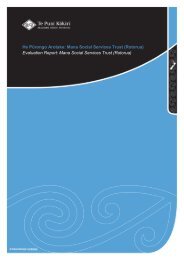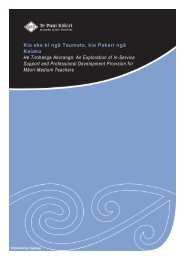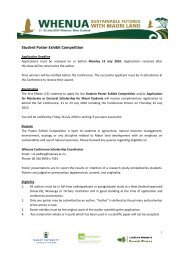Historical Background: PDF 142KB
Historical Background: PDF 142KB
Historical Background: PDF 142KB
- No tags were found...
Create successful ePaper yourself
Turn your PDF publications into a flip-book with our unique Google optimized e-Paper software.
HE TIROHANGA Ö KAWA KI TE TIRITI O WAITANGIMäori, by reassuring them that their mana would remainuncompromised. The Crown’s benevolence and protection wereemphasized instead. It seems probable that Mäori placed at least asmuch emphasis on these comments as they did on the commitmentsrecorded in the texts, given their traditional familiarity with verbalpacts and agreements. 94 Most Mäori present at the signings wereprobably left with the idea that their authority over their customs andlaw would remain intact, that their tribal rangatiratanga would beenhanced, 95 and that British governance would restore law and orderand ward off French interest in the new colony.Hobson, through his interpreters, gave repeated categorical assurancesat Waitangi and Hokianga “that the Queen did not want the land, butmerely the sovereignty, that she, by her officers, might be able moreeffectually to govern her subjects who had already settled … or might… arrive, and punish those of them who might be guilty of crime”. 96Hobson, through his representatives, also pledged that “[Mäori] landwould never be forcibly taken” and that “truth and justice would alwayscharacterize the proceedings of the Queen’s Government”. 97 BothHobson and Busby assured the chiefs that “all lands unjustly held wouldbe returned” to Mäori. 98 At Kaitaia, Hobson’s representative, Lt.Willoughby Shortland, conveyed the Governor’s explicit message that:“The Queen will not interfere with your native laws or customs”. 99Henry Williams, a senior Anglican missionary at Waitangi, assured thechiefs that:… the missionaries fully approved the Treaty, that it was an actof love towards [the chiefs] on the part of the Queen, who desiredto secure them in their property, rights, and privileges.That this Treaty was a fortress to them against any foreign powerwhich might desire to take possession of their country … 100The assurances of the missionaries were instrumental in persuadingthe chiefs to sign the Treaty and in forging an idea among some Mäorithat the Treaty was like a religious covenant. 101 Hobson lateracknowledged the pivotal role of the missionaries. 102 One historianadds that “by the 1840s Mäori engagement with Christianity was real,deep and broad”, 103 which likely contributed to the significance ofmissionary persuasion during the Treaty signing process. 104The right of pre-emption was presented either as a benefit to be gainedor as a concession for retaining tino rangatiratanga. Mäori chiefs atCoromandel were told by Major Bunbury (Hobson’s representative),through missionary interpreters, that pre-emption was intended “tocheck their imprudently selling their lands without sufficientlybenefiting themselves or obtaining fair equivalent”. 105 The Crown, he32



